Life is a Cabaret
Christopher and his Kind, Christopher Isherwood, 1976
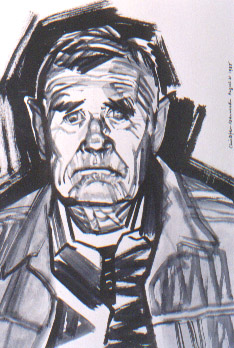
Last Sketch of Isherwood by Don Bachardy
We recently watched an interesting biographical film Chris and Don about the 35 year relationship between British writer Christopher Isherwood and the American portrait artist Don Bachardy. Our Phoenix library is now limited by budget to buying mostly blockbusters like works by Dan Brown and so I picked up an old copy of a 33 year old paperback book that has been sitting around our house forever.
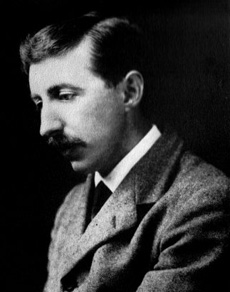
E.M. Forster
The book is a literary memoir by Isherwood of the period of his life from 1929-1939 after which he emigrated to the United States. When you think of the events in Europe in this period, particularly the rise of fascism in Italy, Germany, Spain, and Japan, and think of the great British writers of the Bloomsbury generation (Leonard Woolf, Virginia’s husband, published several of Isherwood’s early novels) and the next generation with E.M. Forster, W.H. Auden, and Isherwood, all of whom were close friends, you can see that this memoir is must reading. Even Paul Bowles makes a cameo appearance, introducing Christopher to drugs which he doesn’t like.
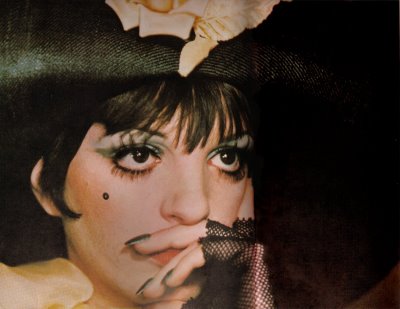
Lizza Minnelli as Sally Bowles
Isherwood is perhaps best known through the 1972 Bob Fosse film Caberet with Liza Minnelli and Michael York which is based on Isherwood’s novel Goodbye to Berlin. Isherwood comments on the film in this memoir that Minnelli was far too talented to play real English woman Sally Bowles. Sally Bowles later introduced Isherwood to a German Hollywood film director looking for a screen writer starting Isherwood on his long later career as a Hollywood screen writer living in Santa Monica.
The memoir is the account of an openly and unapologetically gay young man, his literary work, and his lovers. Isherwood refers to himself in the third person as Christopher throughout the memoir. At first, this seems odd, until you remember that the memoir was published in 1976, 37 years after the period involved. Isherwood was working from correspondence and journals and it must have seemed that Christopher was an entirely different person from the writer of the memoir. Isherwood often mentions details he can’t recall, such is the frailty of human memory.
A large part of the memoir is given to his several year relationship with Heinz, a young working class Berliner, and of Isherwood’s futile attempts to find a safe country for he and Heinz to live peacefully after the Nazis come to power in Germany. This part is a travelogue, as they travel and live on a Greek island, Portugal, the Canary Islands, Belgium, Amsterdam and other places. There is a tragi-comic episode where Christopher borrows 1,000 Pounds from Kathleen to give to a Belgium lawyer to pay for an ill conceived plan to bribe Mexican officials for residence papers. Of course, the money simply disappears. Isherwood’s several attempts to get Heinz into England always fail. On one occasion, Heinz arrives carrying cash to prove he won’t be a burden on the state – along with Christopher’s letter explaining where Heinz is to claim he got the money. Christopher is sure the immigration official himself is homosexual and takes a perverse delight in having Heinz deported. Heinz is finally arrested by the Nazis and sentenced to a year of hard labor followed by two years of military service during which Heinz survives both the Western front and the Russian front. After the war Heinz marries and has a family.
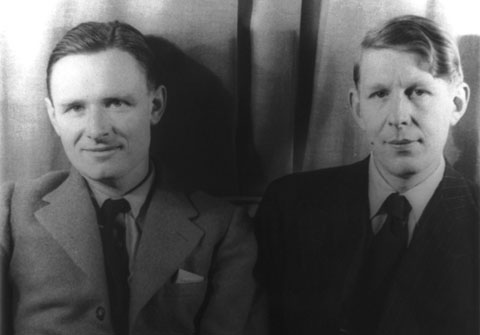
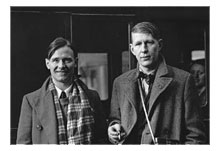
Christopher Isherwood and W.H. Auden
The other major portion of the memoir is given over to Isherwood’s life long friendship with W.H. Auden whom he calls Wystan throughout the memoir. Auden and Isherwood co-wrote a play set in a vaguely Asian country and were asked to choose an Asian country to write a travel memoir. They choose China which has just been invaded by Japan; Isherwood commenting that they could never compete as writers with Maugham and Hemingway (Spanish civil war) so they chose a war and country of their own. This is typical of the tongue in cheek humor which laces the memoir.
On one occasion Erika Mann, daughter of Thomas Mann, has written and produced an anti Nazi play and become an enemy of the Nazi state. She needs to leave Germany and asks Christopher to marry her so she can move to England. Christopher is afraid of the reaction of his mother, who he calls Kathleen throughout the memoir, who very much wants grandchildren, so he turns Erika down. Christopher however suggests that Wystan might be willing and Auden agrees and they are married. In 1939 when Wystan and Christopher have emigrated to the States, they meet Thomas and Katia Mann who are living in Princeton. A photographer from Time asks to take their photo, then says he knows that Auden is the Mann’s son-in-law but who is the other man (Christopher)? Mann instantly replies “family pimp”.
When Christopher and Heinz are living in Portugal, Kathleen comes to visit. He recalls:
Kathleen was welcomed warmly by them (members of the British colony in Lisbon), as an elderly lady of distinction. Her presence at Alecrim do Norte made the Christopher-Heinz relationship suddenly respectable as Christopher had foreseen that it would.
His mother is in her sixties in this period (she turns 70 as Christopher leaves for New York) and he describes their relationship in increasingly warm terms as the memoir progresses. Kathleen becomes Christopher’s de facto literary agent acting on his behalf as he travels the world.
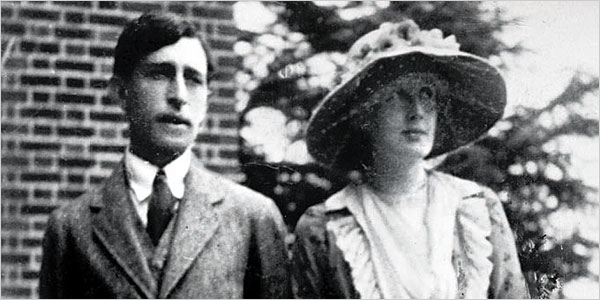
Virginia and Leonard Woolf
Christopher recalls a dinner that Virginia Woolf invites him to attend. Virginia, then in her 50’s, is described at her most beautiful and glamorous. Christopher is totally enthralled, forgetting he has previously arranged a liaison for that same evening. Virginia hardly seems to know who Christopher is even though her husband Leonard has published several novels until W. Maugham offers: “That young man holds the future of the English novel in his hands.” After this time Christopher always thinks of Maugham as “uncle Willie”.
Christopher is having his play On The Frontier performed at the Cambridge Arts Theatre under the sponsorship of John Maynard Keynes. Christopher remarks:
Keynes, that aristocrat of Bloomsbury and the stock exchange, referred to economics as though they were a branch of academic philosophy, quite unrelated to real money. It seemed indelicate to remember the fact that his financial know-how had made his college, King’s, the richest of the Cambridge colleges, and had funded the building of this theatre.
In September of 1938, as Chamberlain travels to Munich for talks with Hitler, newspapers in London produce new editions every 20 minutes as Christopher goes to Victoria station to meet Wystan, who is returning from Belgium. Wystan assures Christopher that there will be no war and Christopher assumes Wystan has learned something from the continent until he finds out a fortune teller is the source of Wystan’s prediction.
This memoir reminds us that the proclivity of intellectuals toward communism during this period is in the context of a general sympathy with the working classes and a fear and antipathy toward the rise of fascism which threatens everyone in Europe. On his political leanings Christopher explains:
He (Christopher) became defiant when he made the treatment of the homosexual a test by which by which every political party and government must be judged…The Soviet Union had passed this test with honors when it recognized the private sexual rights of the individual, in 1917. But in 1934, Stalin’s government had withdrawn this recognition and made all homosexual acts punishable by heavy prison sentences. It had agreed with the Nazis in denouncing homosexuality as a form of treason to the state. The only difference was that the Nazis called it “Sexual Bolshevism” and the Communists “Fascist perversion.”
Christopher arrives in New York determined to acquire a Brooklyn accent and learn to act tough, talking louder and faster than anyone. In America, without European traditions, Christopher realizes he is on his own and must rethink his philosophy and politics. He conducts a thought experiment in which he has a button which, if he pushes it, will destroy the entire Nazi army which he know are evil. But if he pushes the button, he will also destroy Heinz who is innocent. Christopher decides that he is a pacifist.
Christopher comments that he only came to appreciate Britain after it lost its empire and became a second class power after the war. Now it could be enjoyed as a cosmopolitan center without imperial pretensions. Christopher concludes with the memory that Wystan has only three months wait until he meets the love of his life while Christopher must wait a little longer; Don is only four years old.